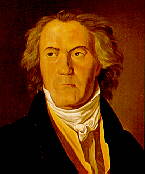![Piano's Solo Corner [Image]](piano8b.gif)
![Piano's Solo Corner [Image]](piano8b.gif)

| Date/Place of Birth: | 16 December, 1770 in Bonn, Germany. |
| Personality: | Gloomy and suspicious, over-sensitive like a misanthropic cobra, often imagining that everybody was plotting against him; besides that, he was bad-tempered especially when his deafness was getting serious -- his grand piano was ruined by his harsh banging to hear what he played. |
| Piano-Playing Style: | Unlike Vienna style such as Mozart's typical gentle
and elegant playing, Beethoven can be very violent. There was a rumour that with hands high,
the young Beethoven smashed the piano, trying to get the rich orchestral sonority on the piano.
That does not indicate that Beethoven was only showing his virtuosity but he always expressed his feelings
while playing -- sadness, anguish, violence and so on.
The following event proved that Beethoven was the greatest piano virtuoso and improviser of his time. |
| Music: | Beethoven's music falls into three periods.
During the first period, his early compositions showed influence from great composers like Haydn and Mozart. Therefore, the music tends to be cheerful, fluent and smooth though there is an occasional explosive power. All these works include the first two symphonies, piano sonatas op 2 etc. Next, the second period set in when Beethoven was very confident and mastered composition skill. His music here started to expand and break the rules of classical forms. He transformed leisurely-paced minuet into turbulent scherzo (eg Symphony no 3 "Eroica"); he was the first to use "motto-themes" throughout the works (typically theme "di-di-di-dum" in Symphony no 5). Lastly, the last period reveals his late string quartets, piano sonatas, Ninth Symphony "Choral" -- music of beauty and granduer. The old Beethoven was stone deaf at that time and composed much music from his deep and suffering feeling. His music was much poetic and sometimes mysterious as long trills and silent passages are found in his works. Yet his application of chorus in his superb Symphony no 9 "Choral" heralded the beginning of Romantic era. |
| Composing Habit: | Beethoven was a slow worker who usually took months or years to complete a work. This could be clearly shown in his sketchbooks where there was struggle of refining the themes. Perhaps such repeated refinement and transformation produced a superb masterpiece. |
| Beethoven's Quote: | "It was impossible for me to leave the world before I had
composed all that I felt needed to produce" Beethoven's decision not to attempt suicide over his deafness, 1802 "Oh you who think that I am bad-tempered, stubborn or misanthropic, how greatly do you wrong me.
You never know the secret cause which makes me seem that way to you.... One sense that was utterly
important to me...I could not afford to say to people,"Speak up, Shout, for I am Deaf!" " "My angel, my all, my very self,....Be calm - love me - today - yesterday - all good wished to you
- my life - my all - all good wished to you - oh, do continue to love me...ever yours, ever mine, ever ours." "Never use the piano while composing" "I shall hear in heaven!" |
| Beethoven's Death: | Beethoven died on 27 March, 1827 caused by cirrhosis of the liver. There were over 20,000 people attending his funeral. |